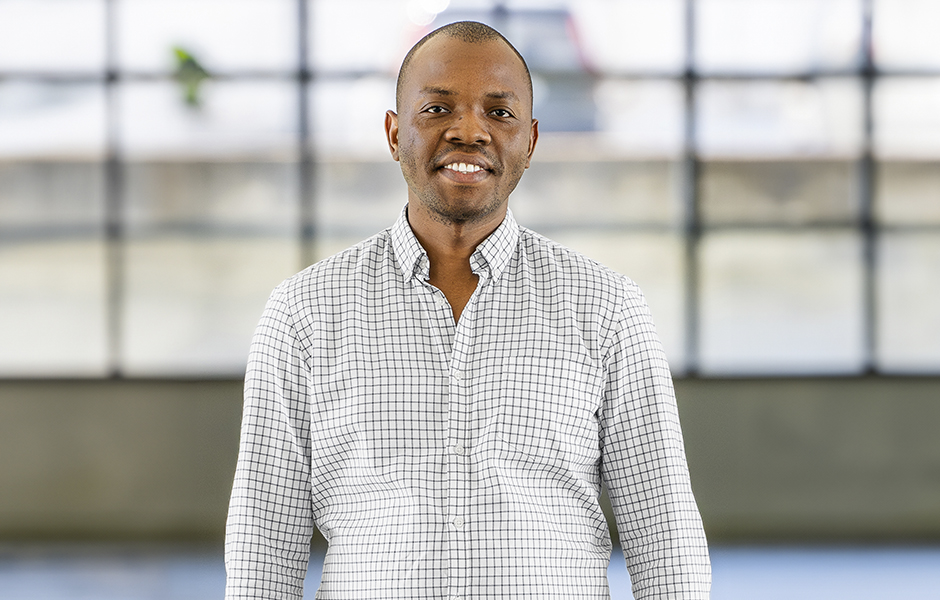Nelson Cuboia, born in Mozambique, is a 34-year-old researcher at CINTESIS and a member of RISE-Health, as well as a doctor and professor at the Faculty of Medicine of the University of Porto (FMUP), where he recently completed his PhD in Clinical Research and Health Services (PDICCS) with a research project on infectious diseases, in particular mapping the incidence and determinants of susceptible tuberculosis, drug-resistant tuberculosis and HIV-AIDS in Mozambique.
He is the son of an evangelical church pastor and a peasant mother, and has lived in different parts of Mozambique. He worked in agriculture and sold sweets to help pay the bills after losing his father at the age of 14. He wanted to be a doctor to alleviate people’s suffering, although he only saw the first one at university.
He studied medicine at the Eduardo Mondlane University in Maputo, more than a thousand kilometres from home, on a scholarship (2009-2015). He worked at the Chicumbane Rural Hospital in Gaza, where he was responsible for the Internal Medicine Service and for setting up the chronic pain and palliative care centre. It was ‘a small seed’ that germinated with the collaboration of organisations in Portugal and France, namely the Portuguese Association for the Study of Pain (APED), Douleurs sans fronteires (DSF) and the Agence Française de Développement (AFD).
France was his gateway to Europe. He did a professional internship at the Lariboisière Hospital and a postgraduate course in Pain Medicine at the University of Paris. In 2017, he went to the Hospital Garcia de Orta, in Lisbon, with a scholarship for an internship in Pain Medicine and enrolled in the Master’s Degree in Palliative Care at the Faculty of Medicine of the University of Porto (FMUP) with a scholarship from the Calouste Gulbenkian Foundation, followed by the PDICCS, at the same institution, with a scholarship from the Portuguese Foundation for Science and Technology (FCT).
His research, carried out over five years, showed for the first time that there are ‘micro-epidemics’ of tuberculosis, especially in the south and centre of Mozambique. Of the 154 districts, 64 are ‘critical’ in terms of drug-sensitive tuberculosis, 26 have a higher incidence of drug-resistant tuberculosis and 39 have worrying numbers in children, which increases the risk of community transmission.
In addition, his studies have shown that the incidence of tuberculosis can be explained by socio-demographic, cultural, economic and environmental factors, as well as the prevalence of HIV. Considered the third leading cause of death in Mozambique, tuberculosis has been declared a ‘national emergency’. Identifying the most affected places makes it possible to prioritise and better manage resources, also bearing in mind that a large part of the funds come from international donors.
Nelson Cuboia’s work is helping to inform public health policies and the mission of non-governmental organisations (NGOs) by mapping and prioritising problem areas. Still eager to learn, his goal is to contribute to increasing knowledge and continuing to help the community and decision-makers through the production of scientific evidence.
What’s your 1-year ambition?
My ambition for the next year is to consolidate the knowledge I have acquired over the years as a doctor, university professor and researcher, expanding the impact of my work in public health by influencing policies through scientific evidence. Together with Professor Luís Azevedo, we intend to establish collaborations with research groups and doctoral programmes from the European Union and the PALOP countries that work in our areas of interest, with the aim of creating synergies and promoting the exchange of experiences in both teaching and research. In addition, I intend to continue supporting the training of new professionals, encouraging clinical and epidemiological research, while advancing my own training.
What is your 10-year ambition?
I hope to be able to contribute to the well-being of the population, especially in the area of health, and to be part of a large, transnational project involving more countries than Mozambique.
How is life beyond research?
In my spare time, I like to chat, watch documentaries and read self-development books.

